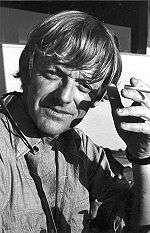Michael Dormer
Michael Dormer or Michael Henry Dashwood Dormer (born 1935 in Hollywood, California, U.S. - 2012) was an American fine artist, writer, songwriter, entrepreneur, and creator of the 1960s TV show Shrimpenstein.

A childhood protégé of artist Louis Geddes, Dormer took first prize in a National Fire Prevention poster contest at age 12. Dormer studied art at San Diego State College and Chouinard Art Institute.[1] At 18 Dormer was working in art full-time.
In 1957 Dormer established a painting studio in La Jolla and moonlighted as a part-time night club comic and jazz poet at the Pour House, a cabaret in Bird Rock. He also published an art and poetry magazine, titled Scavenger.
In 1968 Dormer painted his first aluminum piece; a technique he developed, which has never been used by any other artist. These pieces are part of private collections across the globe. His vast body of work includes his mid-century Crankshaft series, an extensive collection of nudes, oils, watercolors, sculpture, intricate pencil drawings, charcoals, and murals.
Dormer, with his lifelong friend and collaborator, Lee Teacher, created a counter-culture sculpture Hot Curl,[2] a 400-pound (180 kg) concrete statue, and installed it on the rocks near the surf shack at Windansea Beach in La Jolla in San Diego, California. The sculpture of a mop-haired, 6-foot-tall (1.8 m), knobby-kneed surfer gazed out at the sea with a beer in his hand. The pot-bellied surf god quickly became a nationwide sensation, appearing in SurfToons comics and as a plastic model kit, selling hundreds of thousands of copies. Today, Hot Curl appears regularly in Surfer magazine.
In 1964 Dormer's artwork was featured in the opening credits of Muscle Beach Party, which featured the first film appearance of Hot Curl[3] and “Little” Stevie Wonder. He also doubled as a talent scout for that film and subsequent surf films, recruiting actual surfers and surfer girls off the beaches of La Jolla to serve as extras.[4]
In 1963 Dormer and Teacher created and launched Shrimpenstein, an off-beat children's television show which aired live weekdays on Channel 9 in Los Angeles. The program, which featured a miniature Frankenstein monster, brought to life when his creator, Dr. Von Schtick, accidentally dropped a bag of jelly beans in his monster machine. The wacky adventures of the little monster, and his eccentric pals, enchanted, with double entendre, and wit fit for children and adults, grew a great following. Frank Sinatra and his Rat Pack sought out Dormer to tell him they never missed an episode.
In the early 1970s Dormer and his wife Flicka lived in Florence, Italy. While there, Dormer began experimenting with holographic photography. The City of Florence later used his methods as an aid in restoring artworks.[1]
Dormer lived in Ocean Beach in San Diego, California.
Michael Dormer died at home in Ocean Beach, San Diego, California on 10 September 2012. Shortly before his death he had written this short statement about his work [source needed]:
DORMER ON DORMER
I've always considered myself an experimentalist. My subject matter is often whimsical or mysteriously off-beat. I've been told that my work reflects my personality pretty accurately.
I follow no particular established schools of painting and consider my works essentially excursions into alternate fantasy dimensions. Odd creatures abound in these regions and strange allegories unfold. New languages are born and mingle freely with conjured-up communicative symbols.
My paintings are windows looking out into new places at new things.
References
- Dormer, Michael (2017). Michael Dormer and the Legend of Hot Curl. Fantagraphics Books. pp. 207, 208. ISBN 978-1683960171.
- San Diego Historical Society, retrieved 19 Sept 2007
- Fantasy Femmes of Sixties Cinema: Interviews with 20 Actresses from Biker, Beach, and Elvis Movies. Tom Lisanti. ISBN 978-0-7864-0868-9. 2001
- San Diego Union-Tribune, Aug. 8, 2006, retrieved 19 Sept. 2007